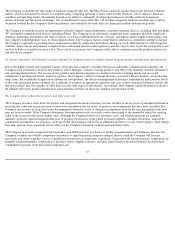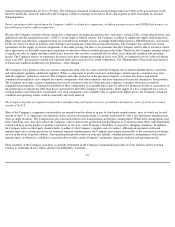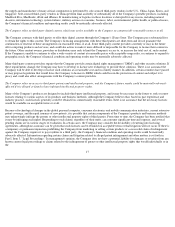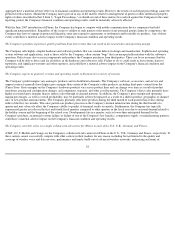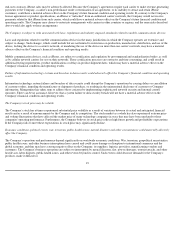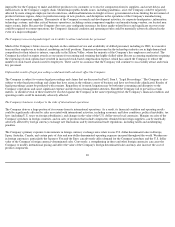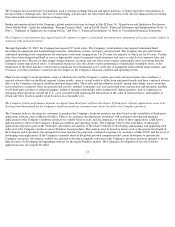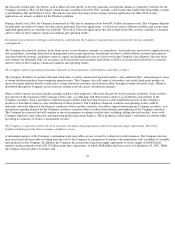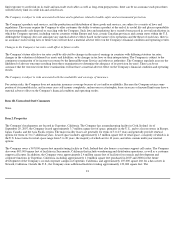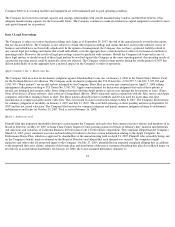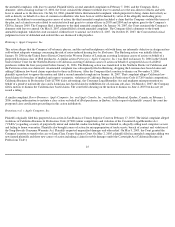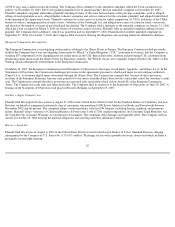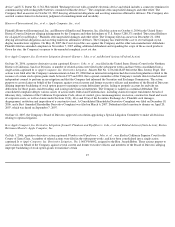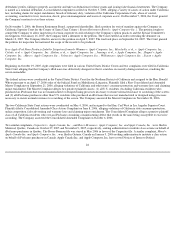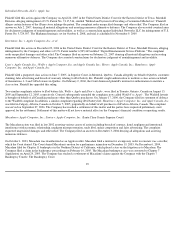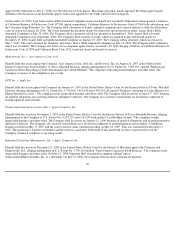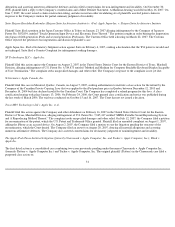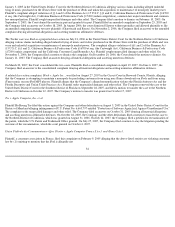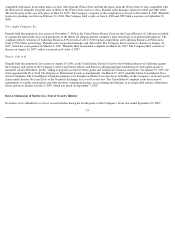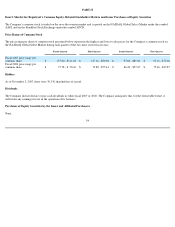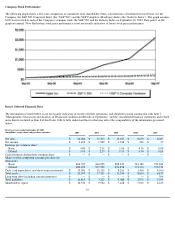Apple 2007 Annual Report Download - page 28
Download and view the complete annual report
Please find page 28 of the 2007 Apple annual report below. You can navigate through the pages in the report by either clicking on the pages listed below, or by using the keyword search tool below to find specific information within the annual report.
the amended complaint, with leave to amend. Plaintiff filed a second amended complaint on February 7, 2006, and the Company filed a
demurrer. After a hearing on June 13, 2006, the Court sustained the demurrer without leave to amend as to the non-director officers and with
leave to amend as to the directors. On July 24, 2006, plaintiff filed a third amended complaint, which purported to bring claims derivatively as
well as directly on behalf of a class of common stockholders who have been or will be harmed by virtue of the allegedly misleading proxy
statement. In addition to reasserting prior causes of action, the third amended complaint included a claim that the Company violated the terms of
the plan, and a claim for waste related to restricted stock unit grants to certain officers in 2003 and 2004 and an option grant to the Company's
CEO in January 2000. The Company filed a demurrer to the third amended complaint. On January 30, 2007, the Court sustained the Company's
demurrer with leave to amend. On May 8, 2007, plaintiff filed a fourth amended complaint. The Company filed a demurrer to the fourth
amended complaint, which the court sustained, without leave to amend, on October 12, 2007. On October 25, 2007, the Court entered a final
judgment in favor of defendant and ordered the case dismissed with prejudice.
Birdsong v. Apple Computer, Inc.
This action alleges that the Company's iPod music players, and the ear bud headphones sold with them, are inherently defective in design and are
sold without adequate warnings concerning the risk of noise-induced hearing loss by iPod users. The Birdsong action was initially filed on
January 30, 2006 in the United States District Court for the Western District of Louisiana asserting Louisiana causes of action on behalf of a
purported Louisiana class of iPod purchasers. A similar action (Patterson v. Apple Computer, Inc.) was filed on January 31, 2006 in the United
States District Court for the Northern District of California asserting California causes of action on behalf of a purported class of all iPod
purchasers within the four-year period before January 31, 2006. The Birdsong action was transferred to the Northern District of California, and
the Patterson action was dismissed. An amended complaint was subsequently filed in Birdsong, dropping the Louisiana law-based claims and
adding California law-based claims equivalent to those in Patterson. After the Company filed a motion to dismiss on November 3, 2006,
plaintiffs agreed not to oppose the motion and filed a second amended complaint on January 16, 2007. That complaint alleges California law-
based claims for breaches of implied and express warranties, violations of California Business & Professions Code §17200 (unfair competition),
California Business & Professions Code §17500 (false advertising), the Consumer Legal Remedies Act and negligent misrepresentation on
behalf of a putative nationwide class and a Louisiana law-based claim for redhibition for a Louisiana sub-
class. On March 1, 2007, the Company
filed a motion to dismiss the California law based claims. The court held a hearing on the motion to dismiss on June 4, 2007 but has not yet
issued a ruling.
A similar complaint, Royer-Brennan v. Apple Computer, Inc. and Apple Canada, Inc., was filed in Montreal, Quebec, Canada, on February 1,
2006, seeking authorization to institute a class action on behalf of iPod purchasers in Quebec. At the request of plaintiffs' counsel, the court has
postponed class certification proceedings in this action indefinitely.
Branning et al. v. Apple Computer, Inc.
Plaintiffs originally filed this purported class action in San Francisco County Superior Court on February 17, 2005. The initial complaint alleged
violations of California Business & Professions Code §17200 (unfair competition) and violation of the Consumer Legal Remedies Act
("CLRA") regarding a variety of purportedly unfair and unlawful conduct including, but not limited to, allegedly selling used computers as new
and failing to honor warranties. Plaintiffs also brought causes of action for misappropriation of trade secrets, breach of contract and violation of
the Song-Beverly Consumer Warranty Act. Plaintiffs requested unspecified damages and other relief. On May 9, 2005, the Court granted the
Company's motion to transfer the case to Santa Clara County Superior Court. On May 2, 2005, plaintiffs filed an amended complaint adding two
new named plaintiffs and three new causes of action including a claim for treble damages under the Cartwright Act (California Business &
Professions Code §
25


